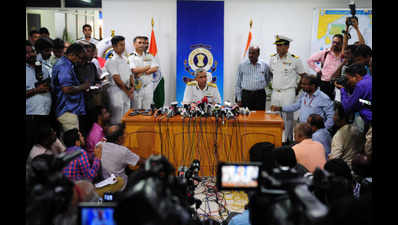- News
- City News
- chennai News
- Pilot may not have switched on AN-32's alert beacon, says manufacturer
Trending
This story is from July 30, 2016
Pilot may not have switched on AN-32's alert beacon, says manufacturer

Indian Coast Guard Region (East) Commander Inspector General Rajan Bargotra speaks to media, as a search and rescue operation for missing Indian Airforce AN-32 (Antenno-32) military transport plane continues, at the regional headquaters in Chennai on July 25, 2016. (AFP photo)
Chennai: Deepening the mystery behind the disappearance of the Indian Air Force (IAF)'s AN-32, the aircraft manufacturer, Antonov, has said the on-board emergency locator transmitter (ELT) may not have been activated because of two reasons - the aircraft hitting the surface without enough force or the pilot failing to switch the device on.
The transport aircraft, on a routine flight to Port Blair with 29 people on board, went missing 270km off the Chennai coast on July 22.
In response to a questionnaire from TOI, the Ukraine-based aircraft company said the aircraft had two ELTs - a stationary ARTEX C406-1 ELT manufactured by ACR Electronics/Artex Products, the US and a French-made portable KANNAD 406AS ELT manufactured by Orolia. "In an emergency, the pilot has to activate the ELT beacon manually. Probably, the pilot of the missing AN-32 did not switch it on. If longitudinal load factor (impact) was less than 2.3g, the stationary ELT would not have activated automatically. Radio waves are not transmitted in the water. There is no signal from ELT under water for this reason," Antonov press service spokesperson said in an e-mail from Ukraine.
Indian Coast Guard eastern region commander Rajan Bargotra had raised concerns over the absence of signals from ELT of the disappeared flight, the only limitation in the massive search operation over the Bay of Bengal code named as 'Operation Talash'. "The limitation is that we are unable to get any signal from the ELT beacon. Had that transmission been available, the search would have been much easier for us. It happened so in a couple of aircraft accidents, which have happened over sea. In none of them, the ELT was operating, like in the case of the ICG Dornier in June 2015," he had told reporters recently.
According to Antonov, the disappeared AN-32 number K-2743, series number 0809 was re-equipped into AN-32RE version by specialists of IAF's 1 Base Repair Depot (BRD) at Kanpur and was fitted with ELTs. The stationary ELT is activated at a frequency of 406MHz if switched on manually or automatically at longitudinal load factor (strike) of more than 2.3g. The Pilot activates the ELT beacon, which in turn transmits a 406 MHz emergency message to search and rescue satellites. The Artex C406-1 transmits three emergency frequencies to the Cospas/Sarsat satellite system, which allows for rapid identification and reduces search and rescue response time.
"There were no rebuke concerning such ELT operation on the AN-32 from other operators," the spokesperson said to a specific question on whether the company had received any complaints over ELTs from clients in other countries.
The erstwhile Soviet Union delivered 118 AN-32 planes to India between 1984 and 1990. While Indian specialists have been trained to execute all maintenance aspects of AN-32, it was done by aircraft repair plant 410 of civil aviation in Kyiv, Ukriane. From 1992 to 1995, specialists of the 1BRD at Kanpur mastered overhaul procedures. So, engineers and technicians of the IAF performed overhaul of AN-32s by themselves, the company added.
To a question on whether the IAF has approached Antonov seeking assistance in search and rescue operations, the spokesperson replied in the negative.
End of Article
FOLLOW US ON SOCIAL MEDIA










